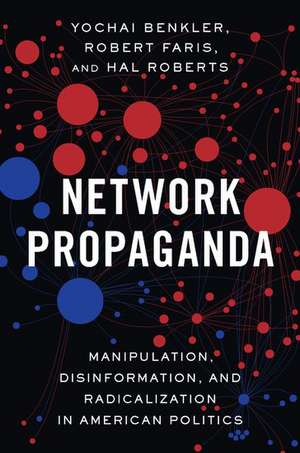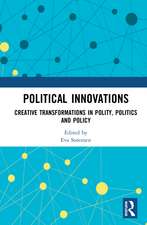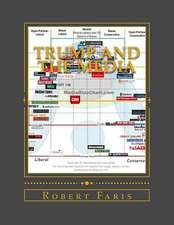Network Propaganda: Manipulation, Disinformation, and Radicalization in American Politics
Autor Yochai Benkler, Robert Faris, Hal Robertsen Limba Engleză Paperback – 22 noi 2018
| Toate formatele și edițiile | Preț | Express |
|---|---|---|
| Paperback (1) | 249.99 lei 32-37 zile | |
| Oxford University Press – 22 noi 2018 | 249.99 lei 32-37 zile | |
| Hardback (1) | 693.26 lei 32-37 zile | |
| Oxford University Press – 29 noi 2018 | 693.26 lei 32-37 zile |
Preț: 249.99 lei
Preț vechi: 280.80 lei
-11% Nou
Puncte Express: 375
Preț estimativ în valută:
47.87€ • 49.84$ • 39.71£
47.87€ • 49.84$ • 39.71£
Carte tipărită la comandă
Livrare economică 03-08 februarie
Preluare comenzi: 021 569.72.76
Specificații
ISBN-13: 9780190923631
ISBN-10: 0190923636
Pagini: 472
Dimensiuni: 234 x 155 x 36 mm
Greutate: 0.91 kg
Editura: Oxford University Press
Colecția OUP USA
Locul publicării:New York, United States
ISBN-10: 0190923636
Pagini: 472
Dimensiuni: 234 x 155 x 36 mm
Greutate: 0.91 kg
Editura: Oxford University Press
Colecția OUP USA
Locul publicării:New York, United States
Recenzii
Overall, this book is a necessary inquiry into the state of propaganda and disinformation networks today.
Network Propaganda presents a great comprehensive overview of the architecture of the U.S. media ecosystem, using various methods such as data analysis, case studies, and textual analysis. With ample data and insightful analysis, this book is an important guide to seek ways to make democracy survive the current epistemic crisis.
[Network Propaganda] provides one of the most comprehensive studies of the US media ecosystem surrounding the 2016 election.
[Network Propaganda is] instantly a necessary text for those of us who study media ecologies.
"There are a lot of books on networks, social media, propaganda, polarization and American politics. This is the best." - Cass Sunstein,Bloomberg, Best Books of 2018
Network Propaganda presents a great comprehensive overview of the architecture of the U.S. media ecosystem, using various methods such as data analysis, case studies, and textual analysis. With ample data and insightful analysis, this book is an important guide to seek ways to make democracy survive the current epistemic crisis.
[Network Propaganda] provides one of the most comprehensive studies of the US media ecosystem surrounding the 2016 election.
[Network Propaganda is] instantly a necessary text for those of us who study media ecologies.
"There are a lot of books on networks, social media, propaganda, polarization and American politics. This is the best." - Cass Sunstein,Bloomberg, Best Books of 2018
Notă biografică
Yochai Benkler is the Berkman Professor of Entrepreneurial Legal Studies at Harvard Law School, and faculty co-director of the Berkman Klein Center for Internet and Society at Harvard University.Robert Faris is the Research Director of the Berkman Klein Center for Internet and Society at Harvard University. Hal Roberts is a Fellow at the Berkman Klein Center for Internet & Society at Harvard University.






















